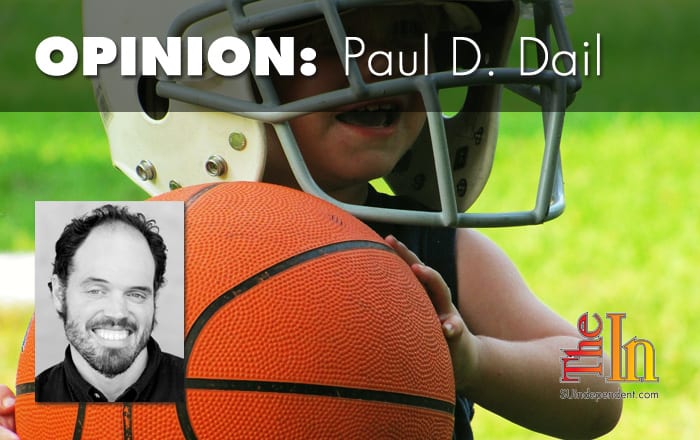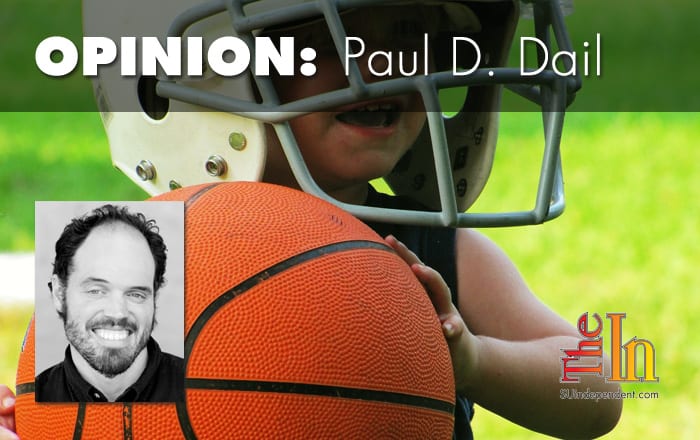
Written by Paul Dail
I had an interesting conversation with the mother of one of my daughter’s preschool classmates. The father of the boy in question played sports in college, but the child had been showing an aptitude for more artistic endeavors. Playing sports is apparently not on his list of top priorities.
So what do you do when your kids don’t play sports?
The mother said she had consoled the boy’s father, telling him that their only Friday night lights would be at a music recital or art show. She said it with a smile and bit of humor, but I could sense the disappointment underneath, and having seen the father wearing athletic apparel on a regular basis, I’m guessing his true feelings wouldn’t have been hidden as well as hers.
This idea of wanting kids to follow in a parent’s footsteps isn’t limited to playing sports, but when it comes to sports, it definitely seems to be a mindset that shows up earlier. You don’t hear a lot of doctors saying, “Well, it looks like our five-year-old isn’t going to go into medicine.”
It makes me feel bad for these kids to think that in many cases (granted, not all), the parents won’t support their children’s decisions at such a young age and may even outright reject them or push them to do something they don’t want to do as they get older.
But before I go any further, let me acknowledge my glaring blind spot on this issue. Besides some flag football and soccer at the YMCA, playing team sports was never something I was interested in as a kid. Nor was I ever pushed to follow a path already trodden by my parents.
So I don’t necessarily understand this mentality of being concerned if your kids don’t play sports. Are team sports necessary for success in this life? Many will say they are, even though I’d maintain that I didn’t need them and still managed to do okay. I think parenting has the potential to go a lot further than coaching, but for that to work, the parents have to work.
And who the hell has time for that these days, right?
However, because I wanted to know the arguments, I did a little online research. In one article from www.families.com, I found a list of ten reasons your kids should be playing sports. Many of them revolved around the positive impacts of exercise: positive self-image, reduced stress, awareness of the negative effects of drugs and alcohol, and—of course—just a generally healthy body.
Are team sports necessary for these benefits? Nope. Any form of exercise will do the trick. However, parents have to be available to facilitate such activities, and when no one is home to be with a kid after school, picking to do something physical unsupervised is probably not most kids’ first choice. It’s probably more along the lines of activities of the electronic variety.
Then we have the listed mental benefits of kids playing sports: learning the value of teamwork, setting goals, leadership, discipline, and being a good sport. Well, unless I learned all those things while sitting in the grass between the goalposts waiting for the other team to kick the ball in my direction, I somehow managed to figure these things out on my own, be it through my academic experiences or, again, through good parenting.
So unless parents who played sports themselves are completely blind to the fact that kids can accomplish these goals without the involvement of a coach and a ball of some sort, for a parent to be disappointed that their kids don’t play sports has to be indicative of something else.
Several months ago, I wrote a column entitled, “How to turn your boy gay.” The gist? Parenting is already hard, but it’s even harder when we try to force our children into a specific niche based on our own desires or beliefs for what they should be doing—be it a sexual orientation, religious belief, or career choice.
Playing sports is unique in this manner. It’s different because in most of those other cases, the adults are still practicing what they think their children should be doing. A doctor tells his kid to be a doctor. A lawyer tells his kid to be a lawyer. A Catholic tells his kid to go to church. But chances are that a father pushing his child to play football isn’t still on the field himself.
So the real root of it may just come down to parents’ perception of what a good, red-blooded American kid is supposed to be doing.
This is America, dammit! And if your kids don’t play sports in America, they’re being picked on by some kid who is playing sports, and I’ll be damned if my kid is gonna get picked on.
In some cases—and I’m not breaking any new ground with this theory—I think it’s parents trying to relive their glory days, especially when you see the sideline “coaches” at some of these kids’ soccer or football games.
Maybe playing sports was great for you. Maybe you never hated going to practice and liked all your teammates and learned how to be a better person as a result. Don’t get me wrong. I’m not saying you shouldn’t at least suggest sports to your kids, especially if they’re not getting any other exercise. And if they’ve expressed an interest in playing a sport, I think it’s important to encourage them to stick it out past just one or two practices. After all, you can’t let the kids be the parents and make all the decisions.
However, in the end, they are different people than you. They may share your genetics and even some of your aptitudes, but that doesn’t mean they will enjoy the same things you did. This is still about parenting, after all. You listen to your kids, you question them, you try to figure out what interests them, and then you encourage and support them in their successes as well as their failures.
And if your kids don’t play sports, don’t worry. It’s not the only route to living a good life. If you’re doing the opposite—pushing your kid to do something they don’t want to do just because it was a positive experience for you—there’s a good possibility you’re causing more damage than good, if not to your child, then at the very least to your relationship with them.
Paul D. Dail is a freelance writer and managing editor of The Independent. He received his BFA in English with a creative writing emphasis from the University of Montana, Missoula. In addition to his contributions to The Independent, he also enjoys writing both creative nonfiction and fiction (with a penchant for the darker side of the page). His collection of flash fiction, “Free Five,” has spent over a year and a half in the top 50 Kindle Horror Short Stories since its publication in 2012.
Currently, Paul lives on the outskirts of Kanarraville, surrounded by the sagebrush and pinyon junipers, with his wife and two children. Read more about him at www.pauldail.com. While he prefers that any comments directed at a specific article be posted in a public forum, he welcomes all other correspondence at [email protected].




